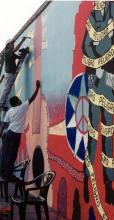Lima and Cuzco, Peru
Sponsored by The Comparative History of Ideas and Latin American and Caribbean Studies
Directed by anthropologist María Elena García (CHID) and political scientist José Antonio Lucero (JSIS), this program offers students an interdisciplinary examination of the intersections of art, culture, and politics in contemporary Peru.
Examining the recent history of Peru and the ways in which artists, activists, and the Peruvian state have used culture for a range of political projects, students will have the opportunity to examine Peruvian society, history and politics through a variety of vantage points. Beginning with a pre-departure seminar during Spring 2011, this 15 credit program continues with a seven week course in Peru. Transnational and multi-sited by design, students will live and study in two major Peruvian cities, coastal Lima and Andean Cuzco. While in Peru students will have the opportunity to learn from and collaborate with Peruvian scholars, activists, and artists. Students will also engage in an independent and/or collaborative project which may be a traditional research paper or a creative artistic endeavor.
Pre-departure Seminar
During spring quarter, participants will be required to attend three pre-departure meetings. The meetings will take place on Fridays from 4:00-6:30pm, on April 29, May 13, and May 27. Pre-departure activities will be focused on introducing students to course themes and mechanics. At these meetings we will also screen the award-winning documentary State of Fear: The Truth about Terrorism, and Ann Kaneko’s film on art and politics in Peru: Against the Grain: An Artist’s Survival Guide to Peru. One additional meeting will be devoted entirely to logistical and practical concerns of traveling to and within Peru. Additionally, during a week in Spring 2011, local instructor Jorge Miyagui will be in residence at UW and will offer introductory lectures (open to the UW community) and conduct one collaborative artistic project (with study abroad program participants).
CHID 472A/SISLA 399A: Peruvian Politics, Culture and Society (5 credits)
This course offers an introduction to the history, culture, and politics of Peru. Examining the legacies of colonialism, political violence, and democratic transition, students will be introduced to critical developments in twentieth and twenty-first century Peru. This course will be co-taught in English by Professors García and Lucero while in Lima, and in Spanish by local instructors in Cusco. As part of this course, students will choose one of two week-long micro-seminars offered in Spanish at the Centro Tinku in Cusco Peru.
CHID 472B/SISLA 399B: Art, Politics, and Protest in Peru (5 credits)
Collaboratively taught (in English and Spanish) by Professors García, Lucero and several invited Peruvian activists, artists, and intellectuals, students will combine classroom and field-based learning to examine the intersections of art and political worlds in Peru. Exploring the legacies of political violence and the impact of state policies through engagement with the work of artists and community organizations, this course examines the negotiation and contention that are part of efforts to rebuild Peruvian democracy. While Spanish language fluency is not required, at least one year of university level Spanish language instruction (or its equivalent) is expected.
CHID499/SISLA 499: Student Independent Project (5 credits)
In consultation with program directors, students will undertake a project of their own choosing and design. Students may work independently or collaboratively in creating an artistic work or research paper incorporating the themes of the program. Examples of such projects include murals, theatrical performances, musical composition, creative writing or empirical research.
The program fee was recently adjusted, and is now finalized at $5,045, including the $350 non-refundable deposit. The program fee will cover instruction costs, housing, and transportation for required field trips.
The program fee does not cover: $250 IPE fee, airfare, meals, insurance or personal travel and expenses.
Make sure to read our Fees, Financing, and Withdrawal page for information on paying for your trip.
